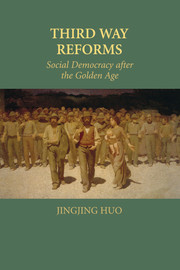Book contents
- Frontmatter
- Contents
- Tables and Figures
- Acknowledgments
- 1 Introduction
- 2 Theorizing the Third Way
- 3 Constraints on Action: Institutions and Ideas
- 4 Prelude to the Third Way: The Unemployment Problem and Earlier Responses
- 5 Expansion in Active Protection
- 6 Restructuring Passive Protection
- 7 Economic and Corporatist Contexts for the Third Way
- 8 Conclusion: Theories of Possibilities
- References
- Index
7 - Economic and Corporatist Contexts for the Third Way
Published online by Cambridge University Press: 20 February 2010
- Frontmatter
- Contents
- Tables and Figures
- Acknowledgments
- 1 Introduction
- 2 Theorizing the Third Way
- 3 Constraints on Action: Institutions and Ideas
- 4 Prelude to the Third Way: The Unemployment Problem and Earlier Responses
- 5 Expansion in Active Protection
- 6 Restructuring Passive Protection
- 7 Economic and Corporatist Contexts for the Third Way
- 8 Conclusion: Theories of Possibilities
- References
- Index
Summary
The third way is premised on labor market activation. Aside from subsidizing new jobs financially, few third way policies directly create jobs from the demand side. Ultimately, the effectiveness of labor market measures depends on an economy with a persistent capacity for job creation. Therefore, in addition to the core strategies of active and passive social protection, effective third way reforms also require an economic context of growth and investment, sufficient enough to sustain and increase employment opportunities in the labor market. Across OECD countries, due to a highly different economic context than in the Golden Age era, economic prudence is more than ever an important condition for sustainable job creation. Since the early 1980s, advanced industrialized economies have intensified the transition to a postindustrial service structure, and concomitantly there has been a further decline in the core manufacturing industries. At the same time, gradual economic internalization, especially in finance, has increased the cost of high budget deficits, and made devaluation or interest-rate manipulation unfeasible. This pressure toward low inflation and small budget deficits was especially strong for countries constrained by the Stability and Growth Pact and the conservative monetarist policy of the European Central Bank (ECB). It is important to emphasize that the key factor behind the pressure toward austerity is the internationalization of finance, rather than production or trade, which has historically been highly integrated internationally, especially for the Northern European economies (Huber and Stephens 2001).
Due to these constraints on government options in stimulating the economy, the extent of partisan differentiation is minimized in economic policy. Nevertheless, there is still some limited evidence for ideological preferences.
- Type
- Chapter
- Information
- Third Way ReformsSocial Democracy After the Golden Age, pp. 268 - 313Publisher: Cambridge University PressPrint publication year: 2009



